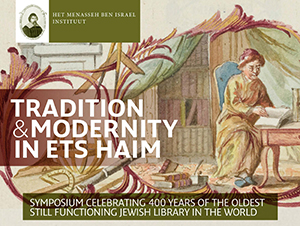Celebrating conversos and 400 years of Ets Haim
Professor Gregory Kaplan Travels to Amsterdam for 400th Anniversary of Ets Haim Library

In the 1600s, Spanish and Portuguese Jews, who were forced to convert from Judaism to Catholicism, fled to Amsterdam in order to return to Judaism in a tolerant society. They established the Portuguese Synagogue of Amsterdam in 1616, which is home to the Ets Haim library – the oldest Jewish library in the world.
Four hundred years later, the library is still a vibrant institution. To celebrate its uniqueness, significance, and history, eminent scholars from around the world will gather for the Tradition and Modernity in Ets Haim Symposium November 24, 2016.
Gregory Kaplan, Distinguished Professor in the Humanities and a professor of Spanish in the Department of Modern Foreign Languages and Literatures, will be among those attending this historic event. He is a featured speaker for the symposium and will present “From Monarchy to Democracy: Ets Haim’s Converso Legacy.”
“My talk will focus on works by the conversos – Spanish and Portuguese forced converts – who were the first to enlist democracy as the model polity in the post-medieval world,” says Kaplan. “In particular, I will be speaking about how two renowned congregants of the Portuguese synagogue during the late 1600s, Miguel de Barrios and Baruch Spinoza, were pioneers in elucidating the advantages of popular democracy over absolutist monarchy, and how their works continue to influence political thought today.”
The Portuguese Synagogue of Amsterdam has an interesting and fortunate history. During World War II, when the Nazis occupied Amsterdam, the synagogue building was mysteriously left untouched. However, the Nazis confiscated the contents of the Ets Haim library because they believed the collection might contain a number of secrets, including the location of lost treasures or secrets relating to the origin of the British Secret Service.
The Monuments Men, a special unit comprised of scholars from the United States and Europe, rescued and returned the Ets Haim collection to the synagogue after World War II.
Kaplan has been a frequent visitor to the library over the years thanks to fellowships from the NEH and the UT Humanities Center. He looks forward to visiting again for the symposium and feels fortunate to take part in such a historic event.
“My own family was forced to flee eastern Europe to the United States during the early 20th century,” says Kaplan. “I feel fortunate to be able to participate in post-Holocaust Judaic studies in Europe.”
In addition, his transdisciplinary research approach is the type of research faculty conduct in the Department of Modern Foreign Languages and Literatures at UT. More specifically, it is the type of research students are encouraged to pursue.
“Although I am a professor of Spanish, my research at the Ets Haim library involves several disciplines in addition to early modern Spanish literature, including history, philosophy, and political science, among others,” says Kaplan. “My research provides a window into how transdisciplinary research may be conducted, which I hope encourages students studying foreign languages and literatures at UT.”
This article was originally published online for the Department of Modern Foreign Languages and Literatures, College of Arts and Sciences at UT.
Leave a comment